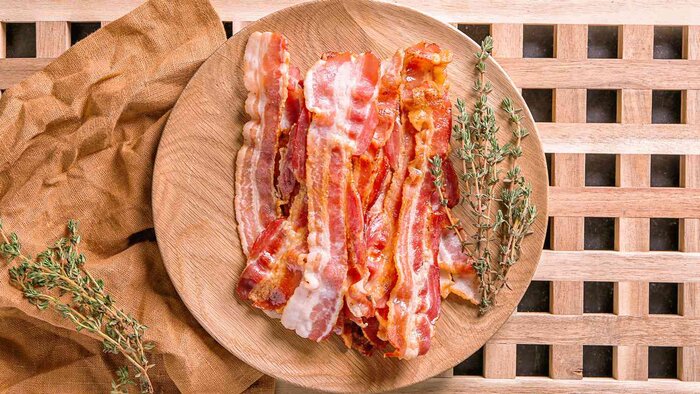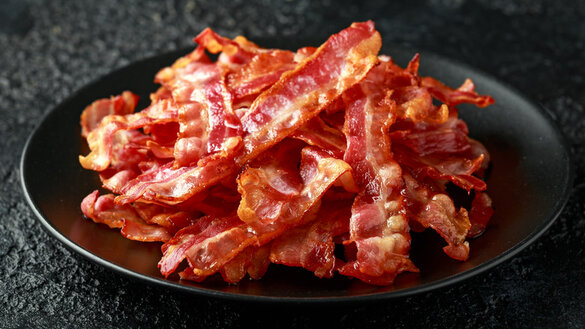Bacon Nutrition: Understanding the Facts About Calories, Protein, Fat, Carbs, and Vitamins
Bacon is a popular breakfast food that has been around for many years. It is made from pork belly that is cured and then sliced into thin strips. While it is delicious, many people wonder about its nutritional value. In this article, we will take an in-depth look at bacon nutrition, including its calorie count, protein content, fat levels, carbohydrate count, and vitamin content. We will also explore some of the potential benefits and drawbacks of consuming bacon.
What Is Bacon

Bacon is a tasty, salty, and savory breakfast food that is enjoyed all around the world. However, many people are curious about the nutritional value of bacon and whether it is a healthy food choice. In this article, we will explore the nutritional content of bacon, including its calorie count, protein content, fat levels, carbohydrate count, and vitamin content. We will also discuss some of the benefits and drawbacks of consuming bacon, as well as provide some tips on how to cook it.
How Many Calories In Bacon
Bacon is high in calories due to its fat content. One slice of bacon contains about 43 calories, while a serving of three slices contains around 129 calories. If you are watching your caloric intake, it is important to keep this in mind when consuming bacon.
How Much Protein In Bacon
Bacon is a good source of protein, with one slice containing around 3 grams of protein. However, it is not the most efficient source of protein, as it also contains a lot of fat. If you are looking for a high-protein breakfast food, you may want to consider other options such as eggs or Greek yogurt.
How Much Fat In Bacon
Bacon is high in fat, which is why it is so tasty. One slice of bacon contains around 3 grams of fat, with about 1 gram being saturated fat. While some fats are healthy and necessary for our bodies, consuming too much saturated fat can lead to health problems such as heart disease. It is important to consume bacon in moderation and balance it with other healthier food choices.
How Many Carbs In Bacon

Bacon is a low-carb food, with one slice containing less than 1 gram of carbohydrates. This makes it a good food choice for those following a low-carb or keto diet. However, it is important to note that bacon is often served with other high-carb foods such as toast or pancakes, so it is important to balance your meal with other low-carb options.
What Vitamins Are In Bacon
Bacon contains several vitamins, including vitamin B1, B2, B3, B5, B6, and B12. It also contains small amounts of vitamin E and K. While these vitamins are important for our overall health, it is important to note that bacon is not a significant source of these vitamins. It is important to consume a balanced diet that includes a variety of fruits, vegetables, and other nutrient-dense foods.
What Are The Benefits Of Bacon
While bacon is often considered an unhealthy food choice, it does have some potential benefits. One study found that consuming bacon and other processed meats may increase the risk of certain types of cancer, while another study found no association between bacon consumption and cancer risk. Bacon is also high in protein and can be a satisfying breakfast food that can keep us full until lunchtime, which may help with weight management. Additionally, bacon contains choline, which is an essential nutrient that plays a role in brain health and development.
Does Bacon Increase Cancer Risk
While bacon does have some potential benefits, it also has several drawbacks. As previously mentioned, bacon is high in fat and calories, which can lead to weight gain and other health problems if consumed in excess. It is also high in sodium, which can contribute to high blood pressure and other cardiovascular problems. Finally, consuming processed meats such as bacon has been linked to an increased risk of certain types of cancer.
Cooking Bacon
When cooking bacon, it is important to be mindful of the cooking method you use. Pan-frying is a popular method, but it can result in bacon that is high in fat and calories. Baking or grilling your bacon can help reduce the fat content and result in a healthier and tastier breakfast option.
Bacon Is Good For Me
In conclusion, bacon is a popular breakfast food that is enjoyed around the world. While it does have some potential benefits, such as its protein content and choline content, it is also high in fat, calories, and sodium. It is important to consume bacon in moderation and balance it with other healthy food choices. Additionally, it is important to be mindful of the cooking method you use, as some methods can result in a healthier and tastier option.